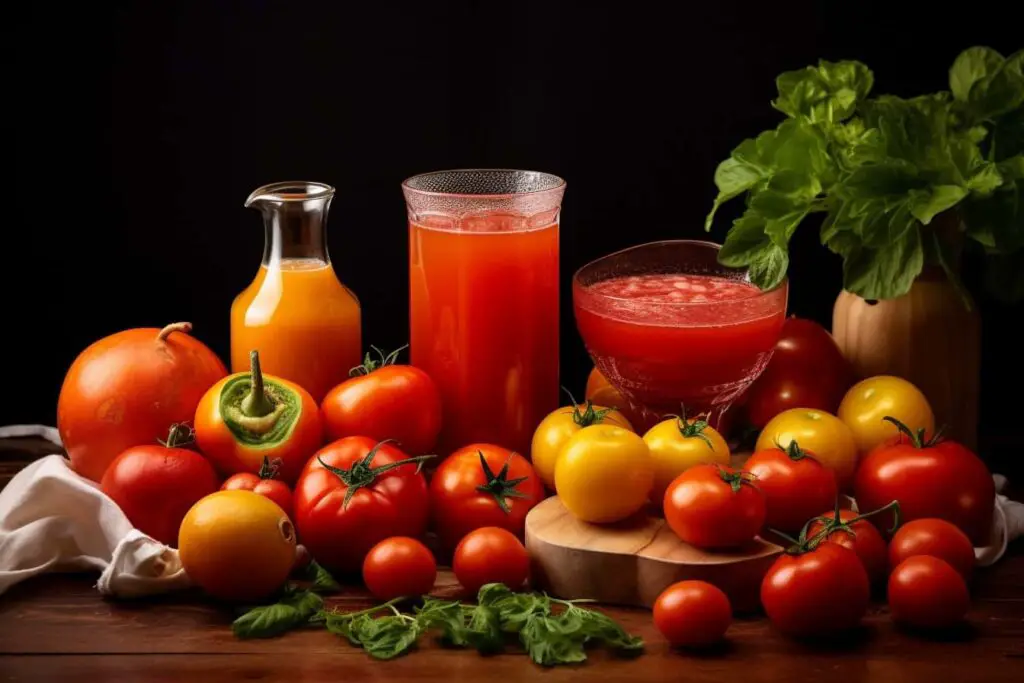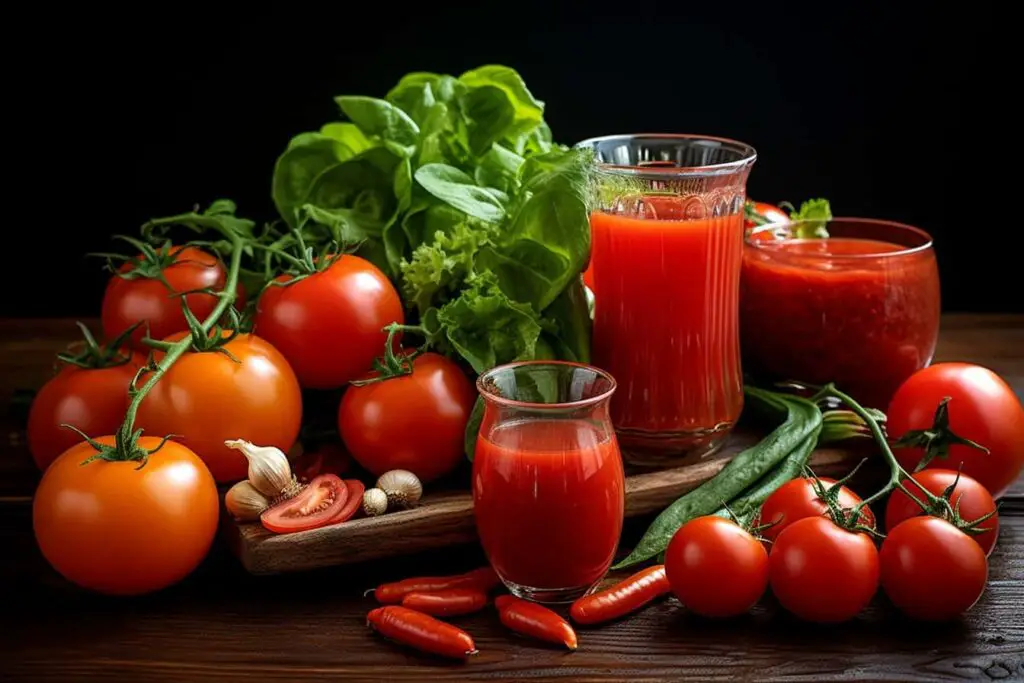Do you suffer from IBS and love tomatoes? You’re not alone! Did you know that over 10% of the population deals with Irritable Bowel Syndrome (IBS)?
In this article, we will unravel the truth about tomatoes and their impact on IBS. We’ll explore their nutritional profile, benefits, concerns, and provide recommendations for incorporating tomatoes into your diet without triggering uncomfortable symptoms.
Get ready to discover evidence-based information that can help you make informed decisions about your tomato consumption.
- Related article: Are Fruits Good for IBS?
Key Takeaways
- Tomatoes are a versatile fruit used in a variety of dishes and come in different varieties and colors.
- Tomatoes have a high nutritional profile, including vitamins A, C, and K, potassium, folate, and lycopene.
- Tomatoes can promote healthy digestion and may help reduce gut inflammation.
- Some individuals may experience allergies or intolerance to tomatoes, and it’s important to consult a healthcare professional for specific dietary needs.

What are Tomatoes
Tomatoes, scientifically known as Solanum lycopersicum, are a versatile fruit that can be used in a variety of dishes from cuisines all over the world.
When it comes to flavor profiles, tomatoes can range from sweet and juicy to tangy and acidic. The taste largely depends on the variety and ripeness of the tomato.
There are many different tomato varieties to choose from, ranging from small cherry tomatoes to large beefsteak tomatoes. They come in various colors, including red, green, yellow, orange, and even purple.
Tomatoes are relatively easy to grow and are commonly cultivated in home gardens as well as on a larger scale by farmers.
Offering multiple health benefits, tomatoes are an excellent source of vitamins A and C, as well as antioxidants like lycopene. These nutrients have been linked to reducing the risk of certain cancers and promoting heart health.
You can use a number of cooking methods, tomatoes can be enjoyed raw in salads or sandwiches or cooked in sauces, soups, or stews. They can be roasted for added depth of flavor or blended into smoothies for a refreshing twist.
Whether you prefer them raw or cooked, there is no denying the versatility and deliciousness that tomatoes bring to the table.
Nutritional Profile of Tomatoes
Did you know that understanding the nutritional profile of tomatoes can provide valuable insights into this vibrant fruit’s potential impact on your health?
Tomatoes are not only delicious but also packed with essential nutrients.
They are a good source of vitamins A, C, and K, as well as potassium and folate. Tomatoes also contain lycopene, a powerful antioxidant that has been linked to various health benefits.
Let’s take a closer look at the nutritional content of tomatoes in the table below from the USDA:
| Nutrient | Amount per 100g |
|---|---|
| Water | 94.5 g |
| Energy | 18 kcal |
| Protein | 0.88 g |
| Total Lipid (Fat) | 0.2 g |
| Carbohydrate | 3.89 g |
| Dietary Fiber | 1.2 g |
| Sugars | 2.63 g |
| Vitamin C | 13.7 mg |
| Vitamin A (RAE) | 42 µg |
| Lycopene | 2570 µg |
| Vitamin K | 7.9 µg |
| Potassium | 237 mg |
| Folate | 15 µg |
- Tomato allergens: While rare, some individuals may experience allergic reactions to tomatoes. Symptoms can range from mild itching or hives to more severe reactions like difficulty breathing or anaphylaxis.
- Tomato and gut health: The fiber content in tomatoes promotes healthy digestion by supporting regular bowel movements and preventing constipation.
- Tomato varieties: There are numerous tomato varieties available. Each variety offers its own unique combination of flavors, textures, and nutritional profile.
- Tomato and digestive enzymes: Tomatoes contain natural enzymes like amylase and protease that aid in breaking down carbohydrates and proteins during digestion.
- Tomato and gut inflammation: Some studies suggest that the anti-inflammatory properties of lycopene found in tomatoes may help reduce gut inflammation associated with conditions like inflammatory bowel disease (IBD).
Pro Tip: For the best lycopene absorption, add some healthy fat like olive oil or avocado to your tomatoes.
Incorporating nutrient-rich tomatoes into your diet can be a great way to support your overall health while enjoying their delicious taste.

Benefits and Concerns of Consuming Tomatoes
You’ll be pleased to know that incorporating nutrient-rich tomatoes into your diet can have a positive impact on your overall health.
But it’s important to be aware of potential concerns as well. While tomatoes are packed with essential vitamins and minerals, some individuals may experience allergies or intolerance to this fruit.
Here’s a table with key benefits and concerns of eating tomatoes:
| Benefits | Concerns |
|---|---|
| High in Vitamin C | Could cause acid reflux |
| Full of antioxidants | Some people may be allergic |
| Good source of potassium | May lead to stomach problems |
Tomato allergies can cause symptoms such as itching, hives, and even anaphylaxis in severe cases.
Tomato intolerance, on the other hand, may lead to digestive issues like bloating and diarrhea.
For those without allergies or intolerances, tomatoes can actually promote gut health due to their high fiber content and antioxidant properties.
Studies suggest that tomatoes may aid in managing symptoms of IBS, such as abdominal pain and irregular bowel movements.
As always, it’s best to consult with a healthcare professional if you have any concerns or specific dietary needs.
Tomato Recommendations for IBS Sufferers
Tomatoes can be a challenge for those with IBS. While some may tolerate them, others experience discomfort after eating them. It is important to understand and decide if they should be included in the diet.
Here’s a table to help offer general recommendations:
| Recommendation | Details |
|---|---|
| Tomato type | Low-acid varieties like yellow or orange are better than high-acid ones like red or green tomatoes. |
| Preparation method | Cooked or processed tomatoes are usually better than raw ones. Roasting, stewing, or making sauces can help. |
| Serving size | Start small and gradually increase, while monitoring symptoms. |
| Combination foods | Avoid dishes with tomato and other trigger foods or high-fat ingredients. |
While some people with IBS find that certain types of tomatoes and preparations can worsen their symptoms, others can tolerate them without any issues.

Is Tomato Good for IBS?
Eating tomatoes can be beneficial for people with IBS. Although some individuals may experience tomato allergy or intolerance, many find that tomatoes are well-tolerated and can even aid in digestion.
Tomatoes are rich in fiber, vitamins A and C, and antioxidants, which all contribute to a healthy digestive system. Lycopene also provides anti-inflammatory properties.
However, it is important to note that every individual with IBS is unique, so it’s essential to listen to your body and determine if tomatoes worsen your symptoms.
If you do experience discomfort after consuming tomatoes, there are alternatives such as low-acid varieties or cooking them before consumption. Incorporating tomatoes into delicious recipes like salads or soups can help diversify your diet while still enjoying the benefits they offer.
| Tomato Pros | Tomato Cons |
|---|---|
| Rich in nutrients | Potential allergy/intolerance |
| Aid digestion | Individual sensitivity |
| Antioxidant-rich |
Is Tomato Sauce Bad for IBS?
Tomato sauce can aggravate symptoms in some people with IBS due to its high acidity. The high acidity can trigger digestive distress such as bloating, gas, and abdominal pain in certain individuals.
If you find that tomato-based products exacerbate your symptoms, there are alternatives available such as white sauces or pesto.
Even though tomato sauce can worsen symptoms for some individuals, it doesn’t mean that everyone with IBS should avoid it altogether.
Low-acid tomato varieties or cooked tomatoes may be better tolerated than others. Making your own sauce gives you more control over ingredients and cooking.
Remember to consult with a healthcare professional or registered dietitian before making any major dietary changes for your individual needs.
Is Tomato Juice Good for IBS?
Tomato juice is refreshing, but it will still have acidity if made from fresh tomatoes. Different people have different tolerance levels. Some may be able to handle tomato juice, while others may find it worsens their symptoms.
Tomato juice offers several potential benefits for digestion and gut health. It is rich in fiber, which can help regulate bowel movements and promote healthy digestion.
The high water content in tomato juice can aid in hydration, which is important for maintaining proper digestive function.
To make tomato juice at home, simply blend ripe tomatoes with a little salt and pepper to taste. You can also add other ingredients like celery or cucumber for added flavor.
It’s best to listen to your body and consult with a healthcare professional before adding tomato juice into your diet if you have IBS.
Are Fresh Tomatoes Bad for IBS
Fresh tomatoes can potentially aggravate IBS symptoms for some individuals due to their high acidity levels.
While fresh tomatoes have several benefits, it’s important to consider alternatives if you have a tomato intolerance or allergy or if you find that they worsen your gut health.
Here are some alternatives to fresh tomatoes that you can try:
- Cooked tomatoes: Cooking tomatoes can help reduce their acidity and make them easier to digest.
- Low-acid tomato varieties: Look for low-acid options like yellow or orange tomatoes, which tend to be milder on the stomach.
- Tomato substitutes: If you still want the flavor of tomatoes without the potential side effects, try using roasted red peppers or sun-dried tomatoes in your recipes.
Are Cherry Tomatoes Bad for IBS?
Cherry tomatoes are low FODMAP and have low acidity that minimize the risk of triggering IBS symptoms, so it can be a good option for IBS. The high fiber content is also a bonus health benefit.
To get a better understand the relationship between cherry tomatoes and IBS, have a look at this:
| Cherry Tomatoes | |
|---|---|
| Fiber content | High |
| Acidity | Low |
| FODMAP content | Low |
| Potential triggers | Uncommon |
It’s important to remember that each person with IBS may have different trigger foods. Even though cherry tomatoes are usually considered safe for most IBS sufferers, it’s always best to pay attention to your own body and observe your own reactions.
Consulting a healthcare pro or registered dietitian can give you personalized advice based on your special dietary needs.
Are Tomato Skins Bad for IBS?
While tomato skins offer several benefits, such as being rich in fiber and antioxidants, they can also pose challenges for individuals with IBS and digestive sensitivities.
Here are some key points to keep in mind with tomato skins and peelings:
Tomato skin benefits:
- High fiber content aids digestion and promotes bowel regularity.
- Antioxidants protect against cell damage and reduce inflammation.
- Nutrients like vitamin C support immune function.
Tomato skin drawbacks:
- Contains a high amount of insoluble fiber, which can be hard to digest.
- Lycopene in tomato skins can irritate IBS.
Tomato skin allergies or sensitivity:
- Some people may experience allergic reactions or sensitivity to tomato skins.
- Symptoms can include itching, hives, rashes, or gastrointestinal discomfort.
- If you suspect a tomato skin allergy or sensitivity, consult an allergist for further evaluation.
Tomato skin cooking methods:
- Cooking tomatoes can help break down the tough outer layer of the skin.
- Blending or pureeing tomatoes can also make them easier to digest.
- Removing the skins before cooking is another option for those with sensitive stomachs.
Remember that everyone’s tolerance varies when it comes to the tomato skins, so you can try unpeeled tomatoes to see what kind of reaction you have, if any. It’s essential to listen to your body and determine what works best for you.
Is Tomato Ketchup Bad for IBS?
Tomatoes generally well-tolerated, but not the processed version in ketchup. High sugar content and additives spell trouble for sensitive digestive systems. Bloating and other discomforts for those with IBS.
Fructose is a type of sugar used to make tomato ketchup that can trigger IBS symptoms, especially in individuals who have fructose malabsorption. While tomato ketchup typically contains a moderate amount of fructose corn syrup, it’s important to be mindful of your tolerance level and consider the overall fructose intake from other sources.
Homemade or low-sugar varieties of tomato ketchup better options. Less added sugars and no unnecessary additives. More digestible, same flavor.
Experimenting with homemade tomato-based sauces using fresh ingredients may allow for better control over the ingredients and cooking process.
It is recommended to monitor your own reactions to ketchup and consult with a healthcare professional for personalized advice.
Are Raw Tomatoes Bad for IBS?
For individuals with IBS, consuming raw tomatoes may exacerbate symptoms such as bloating and abdominal pain. While tomatoes are generally considered a healthy food, they can be problematic for those with IBS.
Here are some important points to consider:
- Raw tomatoes contain high amounts of fiber and fructose, which can trigger IBS symptoms in some individuals.
- Raw tomatoes contain lycopene, with antioxidant properties. This could help reduce inflammation in the body and benefit IBS sufferers.
- Raw tomatoes are acidic and might irritate the digestive system.
- Tomato intolerance is different from an allergy, as it does not involve the immune system but rather an inability to properly digest certain compounds found in tomatoes.
- Following a tomato-free diet doesn’t mean missing out on nutrients; there are plenty of other fruits and vegetables that can provide similar health benefits.
Are Tomatoes Good for IBS Diarrhea
Tomatoes, being low in FODMAPs, are generally considered safe for individuals with IBS diarrhea. However, it’s important to exercise caution as excessive consumption or certain preparations can still trigger symptoms.
The impact of this juicy veggie on individuals with IBS diarrhea has been a hot topic. Some say it can worsen symptoms, but others believe it’s essential for gut health.
Contrary to popular belief, there’s no historical evidence linking tomatoes to IBS diarrhea. It’s mainly based on anecdotal experiences.
Researchers are investigating potential effects of various foods on IBS symptoms, so evidence-based guidance will be available.
The fiber content in tomatoes can help digestion and promote regular bowel movements. They’re also packed with vitamins A and C, plus antioxidants.
But not everyone reacts the same way. Histamines and lectins in tomatoes can cause inflammation in sensitive individuals.
It’s important to consider each individual’s unique response. A healthcare professional or dietitian can help determine if tomatoes should be included or excluded.
Are Tomatoes Low FODMAP?
Yes, tomatoes are considered low-FODMAP, but there are some important points to consider if you’re on a low FODMAP diet.
Tomatoes contain small amounts of FODMAPs, specifically fructose and fructans. The amount is considered low enough to tolerate for most individuals with IBS, but it’s still important to monitor your own response.
Tomatoes contain moderate levels of fructose and polyols, but the amounts are low enough that they’re considered FODMAP friendly by researchers like Monash University.
Tomato paste is a popular form of tomato that’s available in many recipes, especially on pizzas. It’s a thick, concentrated form of tomatoes, so it will contain higher acidity due to its lack of water.
The paste has also higher levels of fructose and polyols though, so it’s important to pay attention to your portion size if you’re following a low-FODMAP diet.

Tomatoes and IBS Final Thoughts
If you suffer from IBS, tomatoes may not be your best friend. While they offer a tantalizing taste and are packed with nutrients, their high acidity and potential to trigger symptoms make them a risky choice.
However, it’s important to remember that everyone’s body is different. Some IBS sufferers may find that tomatoes don’t bother them at all.
Here are some key takeaways to consider:
- Tomato Allergy: If you suspect a tomato allergy, it is best to avoid tomatoes altogether and consult an allergist for proper diagnosis and guidance.
- Cooking with Tomatoes: Cooking tomatoes can help break down certain compounds that might be more difficult to digest raw. So, if you love tomatoes but experience discomfort, try cooking them before consuming.
- Tomato Alternatives: If you find that tomatoes consistently aggravate your symptoms, experiment with alternative ingredients like bell peppers or cucumbers to add flavor and texture to your meals.
- Tomato and Gut Health: Tomatoes contain beneficial nutrients like lycopene, which has been associated with improved gut health. However, everyone’s response is unique, so pay attention to how your body reacts, even if it’s a single tomato.
- Tomato and Digestion: Some individuals may experience digestive issues when consuming tomatoes due to their acidity. Moderation is key; listen to your body’s signals.
While tomatoes can trigger symptoms in some individuals with IBS, it’s important to remember that each person’s tolerance may vary. It’s always best to listen to your body and consult with a healthcare professional for personalized advice.
Also check out these other fruits and foods that may affect your IBS symptoms:
Frequently Asked Questions
Can Tomatoes Be Harmful to Individuals With IBS?
Tomatoes can be harmful to individuals with IBS if they have a tomato intolerance. If you experience digestive symptoms after consuming tomatoes, consider alternative vegetables and a tomato-free diet.
Are There Any Health Benefits of Tomatoes for Individuals without IBS?
Absolutely! Tomatoes are a rich source of essential nutrients such as vitamins A, C, and E, as well as antioxidants like lycopene. They are known to support cardiovascular health, promote healthy skin, and boost the immune system in individuals without IBS. They can contribute to gut health and be part of a balanced diet. However, it’s important to consider tomato sensitivity in IBS and tailor meal plans accordingly.
Are All Tomatoes Equally Problematic for Those with IBS?
No, the severity of IBS symptoms triggered by tomatoes can vary among individuals. Some people may be more sensitive to certain types of tomatoes, such as raw ones, while others may tolerate cooked or processed tomatoes better. It is advisable to keep a food diary to track personal triggers.
Are There Any Tomato Alternatives for Individuals with IBS?
Yes, there are tomato alternatives that are generally well-tolerated by individuals with IBS. These include low-FODMAP vegetables like cucumber, zucchini, and bell peppers. Additionally, using tomato substitutes like pureed carrots or squash can provide a similar texture and flavor in recipes.
Can Tomatoes Cause IBS in Individuals Who Previously Had No Symptoms?
While tomatoes can exacerbate existing IBS symptoms, they do not typically cause IBS in individuals who previously had no symptoms. IBS is a chronic condition with various triggers, and tomatoes are just one potential trigger among many others.
Should Individuals with IBS Completely Avoid Tomatoes?
Whether individuals with IBS should completely avoid tomatoes depends on their personal tolerance levels. Some may find that eliminating tomatoes from their diet helps alleviate their symptoms, while others may be able to consume them in moderation without experiencing significant issues. Consulting with a registered dietitian or healthcare professional is advised to create an individualized diet plan.
Sources:
- https://fdc.nal.usda.gov/fdc-app.html#/food-details/170457/nutrients
- https://www.ncbi.nlm.nih.gov/pmc/articles/PMC8869745/
- https://www.ncbi.nlm.nih.gov/pmc/articles/PMC4112903/
- https://www.ncbi.nlm.nih.gov/pmc/articles/PMC9658010/
- https://www.monash.edu/__data/assets/pdf_file/0008/994706/dietarymanagementofgisymptomsfodmaps.pdf
- https://healthcare.utah.edu/healthfeed/2015/08/manage-irritable-bowel-syndrome-ibs-diet

